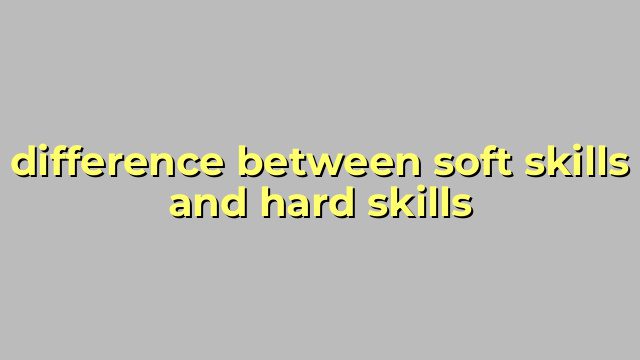Understanding the Difference between Soft and Hard Skills
When it comes to skill sets, they are generally divided into two categories – Soft skills and Hard skills. In simple terms, Hard skills are specific, measurable abilities that are needed for a specific job. Soft skills, on the other hand, are personal traits that help individuals to work effectively with others. In this article, we will explore the differences between soft and hard skills and see how they complement each other in the workplace.
What are Hard Skills?
Hard skills are generally related to technical or job-specific abilities. These include things like proficiency in computer software, programming languages, writing, and other specialized skills. An engineer, for example, will need to have the technical know-how of his industry to perform his job effectively. Similarly, a writer must have a good command of language and grammar to create compelling content.
The value of hard skills is that they are measurable, and it is easy to demonstrate how they meet the requirements of a particular role. Employers typically evaluate candidates based on their hard skills, and they are often used as the criteria for determining who gets the job or a promotion.
What are Soft Skills?
Soft skills, also known as people or interpersonal skills, refer to the personal attributes that help individuals interact with people. These skills include communication, teamwork, problem-solving, leadership, emotional intelligence, adaptability, and time management.
While soft skills are less measurable than hard skills, they are equally essential in the workplace. Employers typically look for employees who possess excellent communication skills, can work well in teams, take ownership of their work, and demonstrate leadership qualities.
How Soft Skills and Hard Skills Complement Each Other
While hard skills are crucial for getting the job done, soft skills are equally important for success in the workplace. In fact, many experts believe that soft skills are just as critical as hard skills in many roles.
For example, a software engineer who is technically proficient but cannot communicate well with his team members is unlikely to achieve success. Similarly, a marketing executive who is an excellent communicator but lacks the necessary technical skills to analyze data is unlikely to be fully effective.
The key is to find a balance between hard and soft skills. Employers need to look beyond the hard skills required for the job and assess the candidate’s interpersonal abilities as well. It is not enough to hire someone who has an impressive technical skill set if they are unable to work with others effectively.
In conclusion, hard skills and soft skills are two sides of the same coin. Employers need to recognize the importance of soft skills and their impact on employee success. By incorporating both sets of skills in hiring and training processes, employers can create well-rounded teams that can work effectively together to achieve success.
Table difference between soft skills and hard skills
| Soft Skills | Hard Skills |
|---|---|
| Interpersonal skills | Technical skills |
| Communication skills | Computer skills |
| Time management | Mathematical skills |
| Leadership skills | Writing skills |
| Teamwork | Project management |
| Problem-solving | Data analysis |
| Adaptability | Programming |

